Key takeaways:
- The academic publishing process involves patience and understanding the importance of peer feedback to enhance research quality.
- Meeting deadlines builds credibility and fosters collaboration, while self-discipline helps manage stress and motivates researchers.
- Effective time management strategies include breaking tasks into smaller sections and setting non-negotiable deadlines for personal accountability.
- Maintaining a balanced work schedule requires planning, regular breaks, and adaptability to prioritize tasks effectively in high-pressure situations.
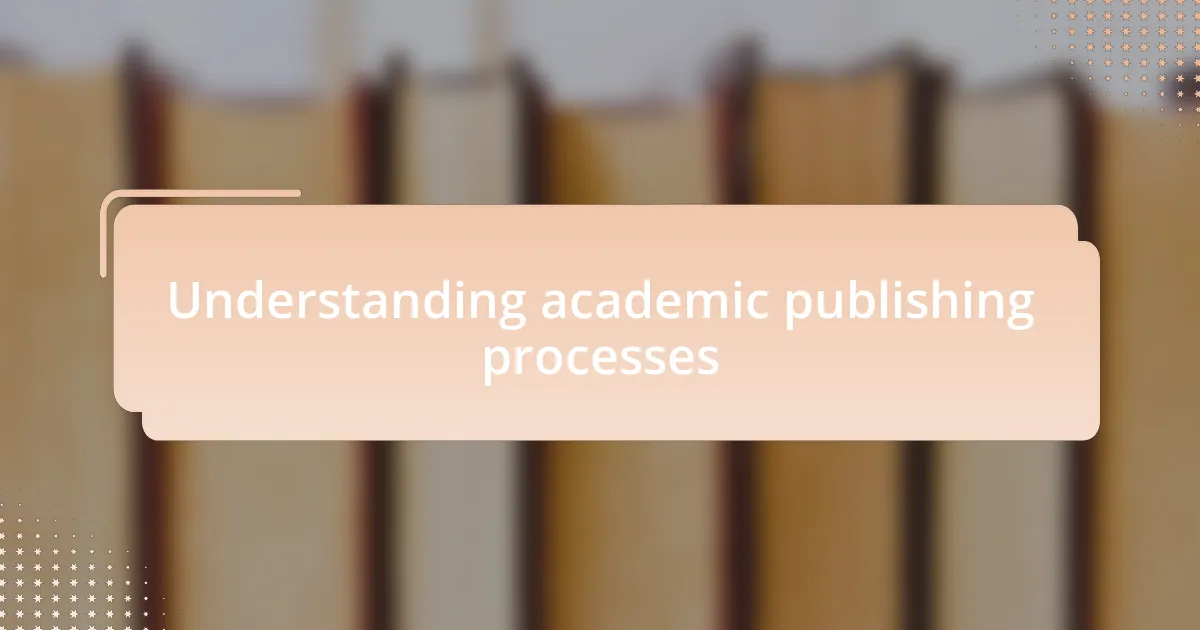
Understanding academic publishing processes
Understanding the academic publishing process can often feel like navigating a complex maze. I remember the first time I submitted a paper; the weight of uncertainty was overwhelming. Will the reviewers appreciate my arguments? This feeling is common among early researchers, and it’s essential to remember that each step — from submission to peer review — is designed to enhance the quality of the work.
The peer review process is particularly critical and, in my experience, can be both humbling and enlightening. Receiving feedback from reviewers often feels like a rite of passage, revealing both the strengths and weaknesses of your research. Have you ever felt your heart race while reading through comments that challenge your ideas? I have. It became a learning opportunity for me, shedding light on how to refine my arguments and improve my writing.
Moreover, the timeline of academic publishing can vary widely from journal to journal. I once waited six months for a response that felt like an eternity, only to receive a revision request. What I learned was patience and persistence. Understanding these timelines is crucial; it helps to align your dissertation deadlines with your publication goals, ultimately easing the balancing act of both commitments.
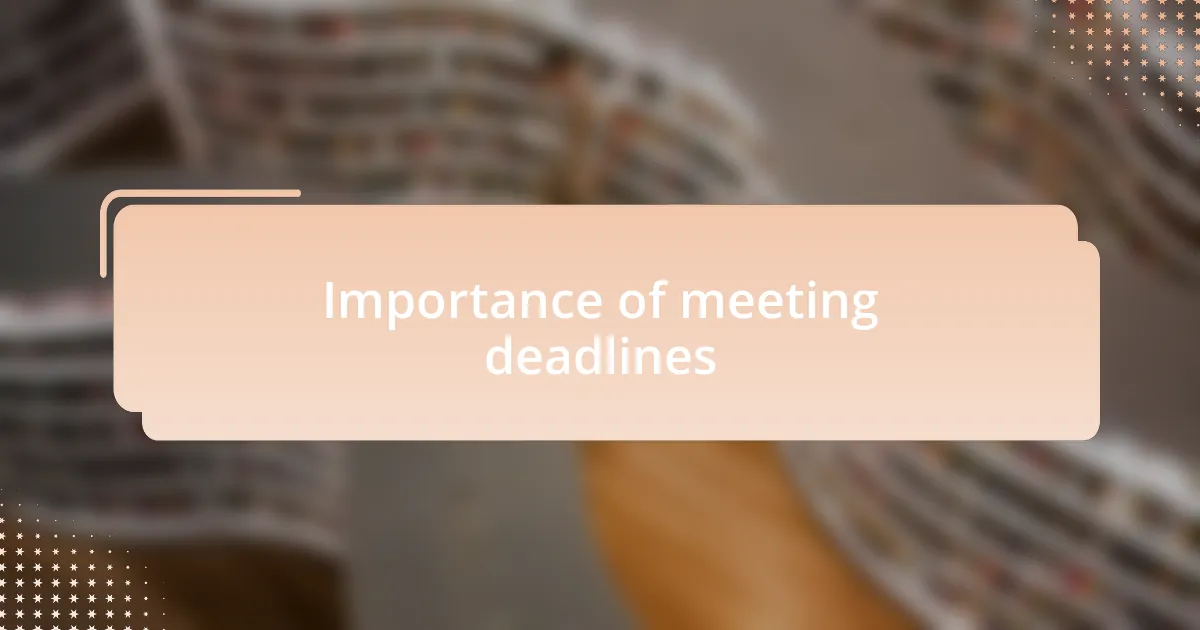
Importance of meeting deadlines
Meeting deadlines in academia is not just about organizational skills; it’s about building a reputation. I recall a time when a colleague missed a submission date. The fallout wasn’t just missed publication; it created a ripple effect, impacting their perceived reliability within our research community. Have you ever missed an important deadline? The consequences can be more than just personal stress; they can affect collaborative projects and future opportunities.
In my own experience, adhering to deadlines has opened doors to new networks and collaborations. I vividly remember submitting a paper just in time for a conference. Because I met that deadline, I was able to discuss my findings with influential scholars in my field. It was a pivotal moment that highlighted how crucial punctuality can be in leveraging academic relationships.
Moreover, meeting deadlines fosters self-discipline, a vital trait for any researcher. I’ve learned that setting clear milestones not only keeps me on track but also reduces anxiety. Have you ever felt that rush when completing a task on time? That sense of accomplishment fuels motivation for future challenges, making the entire academic journey more rewarding and less daunting.
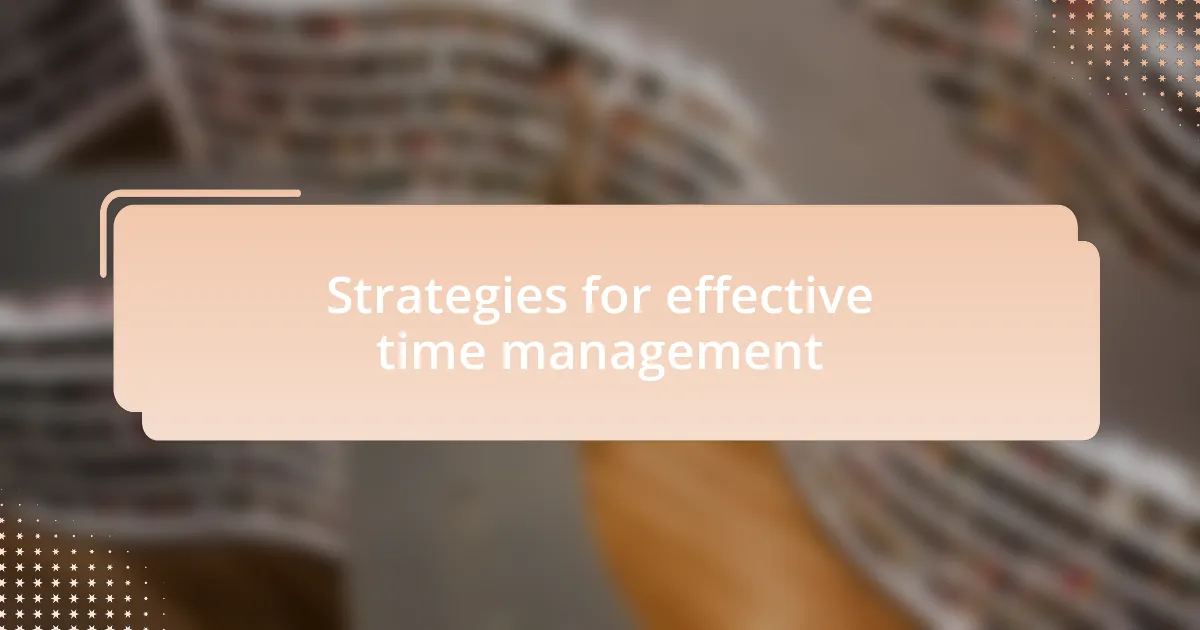
Strategies for effective time management
When it comes to managing time effectively, breaking tasks into smaller, manageable chunks can be a game-changer. I often create detailed schedules that include specific goals for each week, helping me stay focused. Have you ever felt overwhelmed by the sheer size of a project? That’s why I find it helpful to prioritize tasks and tackle the most daunting ones first when my energy is at its peak.
Another strategy involves setting specific, non-negotiable deadlines for myself, even ahead of official due dates. I once decided to submit a draft of my dissertation to my advisor three weeks early. This not only gave me extra time to refine my arguments but also reduced the pressure I felt as the ultimate deadline approached. Have you tried giving yourself that breathing room? It can lead to a clearer mind and better results.
Lastly, I’ve learned the power of regular breaks to maintain productivity. When I immerse myself in writing for a few hours, stepping away for a short walk or a quick chat with a colleague often sparks new ideas. What about you—have you experienced the creative boost that a little downtime can provide? It’s essential to remember that time management isn’t just about rigid schedules; it’s about finding a balance that works for your personal workflow.
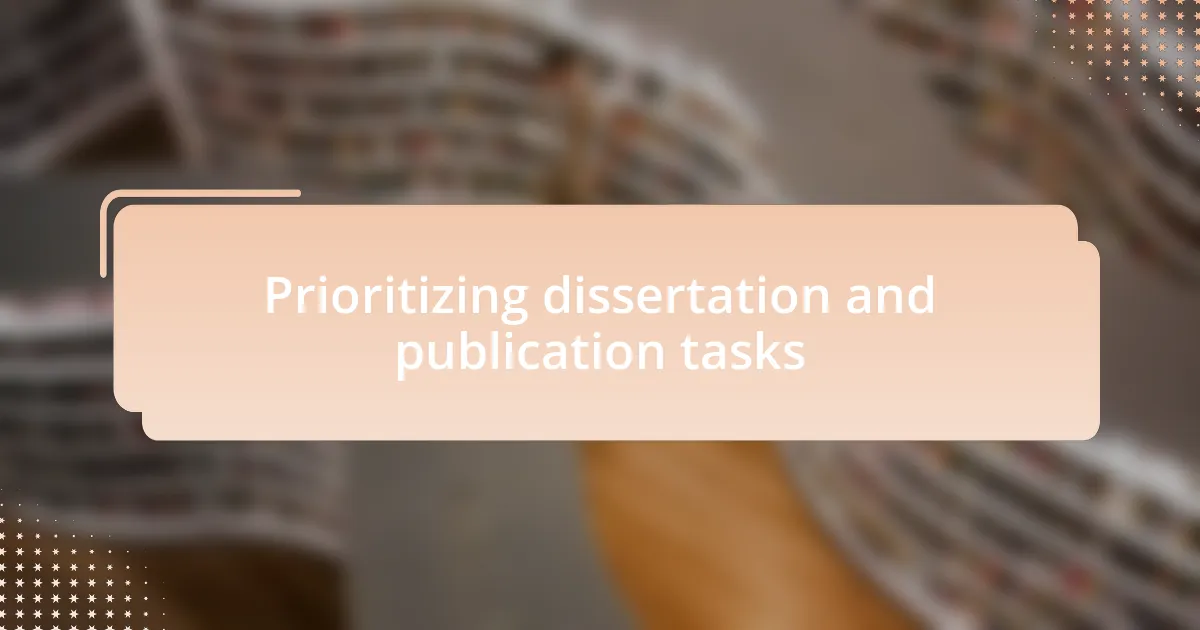
Prioritizing dissertation and publication tasks
When I faced the dual challenge of dissertation and publication deadlines, prioritization became my lifeline. I made a habit of assessing tasks based on their urgency and impact. For instance, I once had to decide whether to finalize a paper for a conference or polish a dissertation chapter. By evaluating which task aligned more closely with my long-term goals, I ensured that my efforts propelled me forward rather than getting caught in a cycle of indecision.
I discovered that visual tools, like charts or lists, can help in prioritizing. I remember creating a color-coded matrix that identified deadlines, project stages, and even my current motivation levels. Did that seem like an overwhelming task at first? It did, but once I broke it down, I appreciated how clear it made my priorities. The act of seeing where my focus should lie not only alleviated stress but also helped manage my workload effectively.
Another lesson I learned was the importance of flexible priorities. There were days when I thought my dissertation chapter deserved full attention, only to find a journal publication had sudden revisions due. This unpredictability taught me to reassess my priorities regularly. Have you ever had to pivot unexpectedly? It’s those moments that remind us: adaptability is key in academia, and knowing when to shift gears can lead to greater success in both areas.
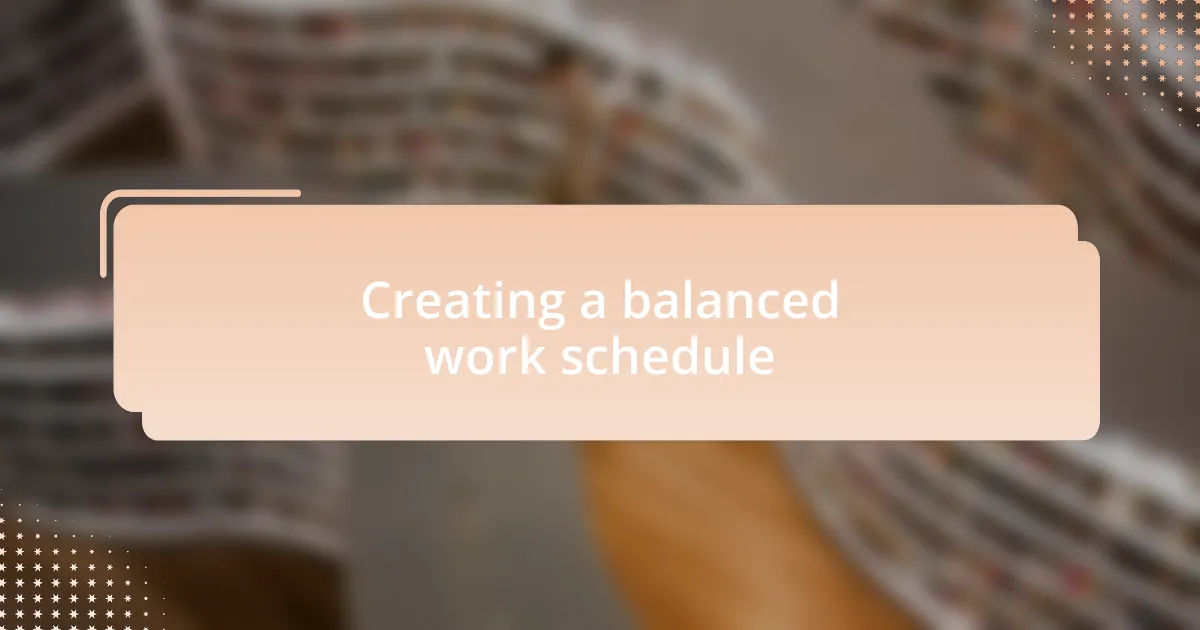
Creating a balanced work schedule
Creating a balanced work schedule is about finding that sweet spot between structure and flexibility. I remember when I first started mapping out my days; I often felt overwhelmed just by looking at my to-do list. That feeling of pressure made me realize I needed to slot specific times for both dissertation writing and publication work, treating each task with equal importance. Have you ever tried setting aside dedicated blocks of time? It’s liberating to know you can focus entirely on one task without the nagging worry of other deadlines creeping in.
One technique that proved invaluable was planning my week every Sunday evening. This practice transformed my approach. I would sit down, reviewing my upcoming deadlines and estimating how long each task might take. I found that writing down my commitments helped illuminate the gaps where I could sneak in publication revisions or dissertation writing. Ever had those moments where everything just clicks? That was it for me, as I learned to allocate time wisely and prevent any crunch periods.
During particularly busy weeks, I also needed to carve out breaks. I discovered that overloading my schedule not only sapped my energy but also affected the quality of my work. Every couple of hours, I’d step outside for fresh air or grab a cup of tea. Why does this matter? Because those small pauses rejuvenated my mind, making me more productive and focused. Balancing deadlines isn’t just about managing time; it’s also about nurturing yourself in the process.
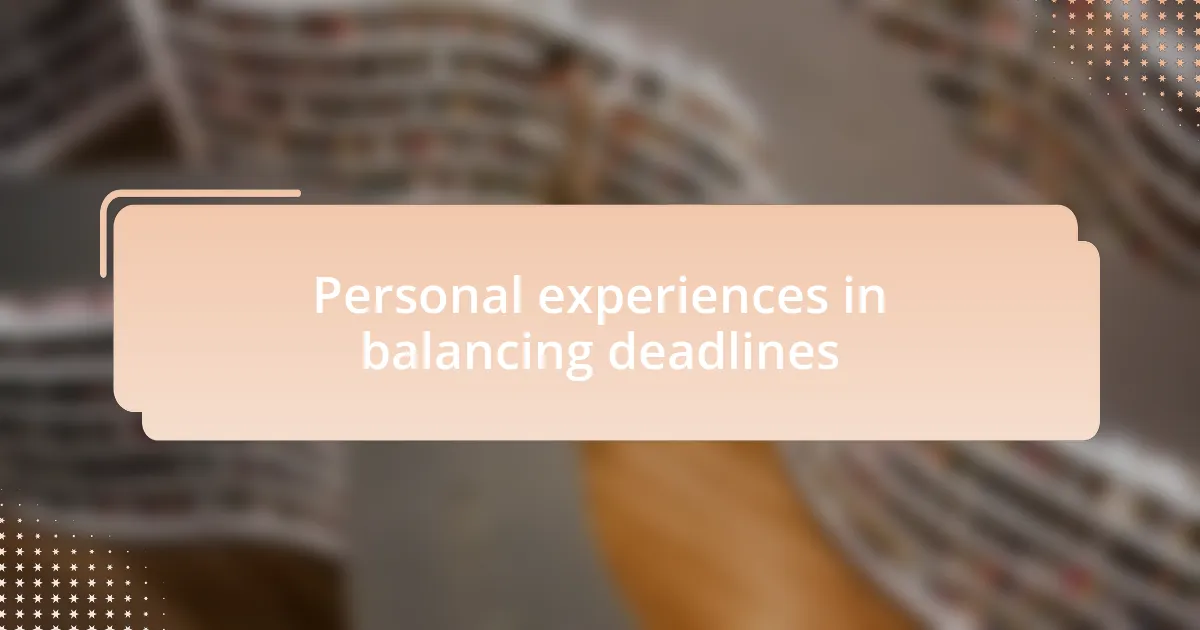
Personal experiences in balancing deadlines
I recall one intense month where my dissertation and publication deadlines were stacked one after the other. It felt like I was walking a tightrope, trying not to lose my balance. At one point, I found myself writing late into the night, fueled by coffee and anxiety. It was a wake-up call when I realized that my best ideas came during moments of stillness. Have you ever discovered that taking a step back often leads to greater clarity?
There was a week when I had to submit an article for a journal while also finalizing a chapter of my dissertation. It was a daunting task. I decided to break both projects into manageable sections, setting smaller goals within each day. I’d check off each completed task, and that little satisfaction became my motivation. Isn’t it amazing how celebrating small wins can shift our perspective on overwhelming workloads?
On days when I felt completely drained, I would remind myself why I embarked on this journey. The stories I uncovered during research brought joy to my writing, even amidst the stress. I started sharing my struggles with peers in writing groups, and those conversations often led to collaborative brainstorming sessions, igniting new ideas. Have you ever experienced that rush when sharing challenges with others? It’s transformative, reinforcing the notion that we don’t have to navigate this path alone.